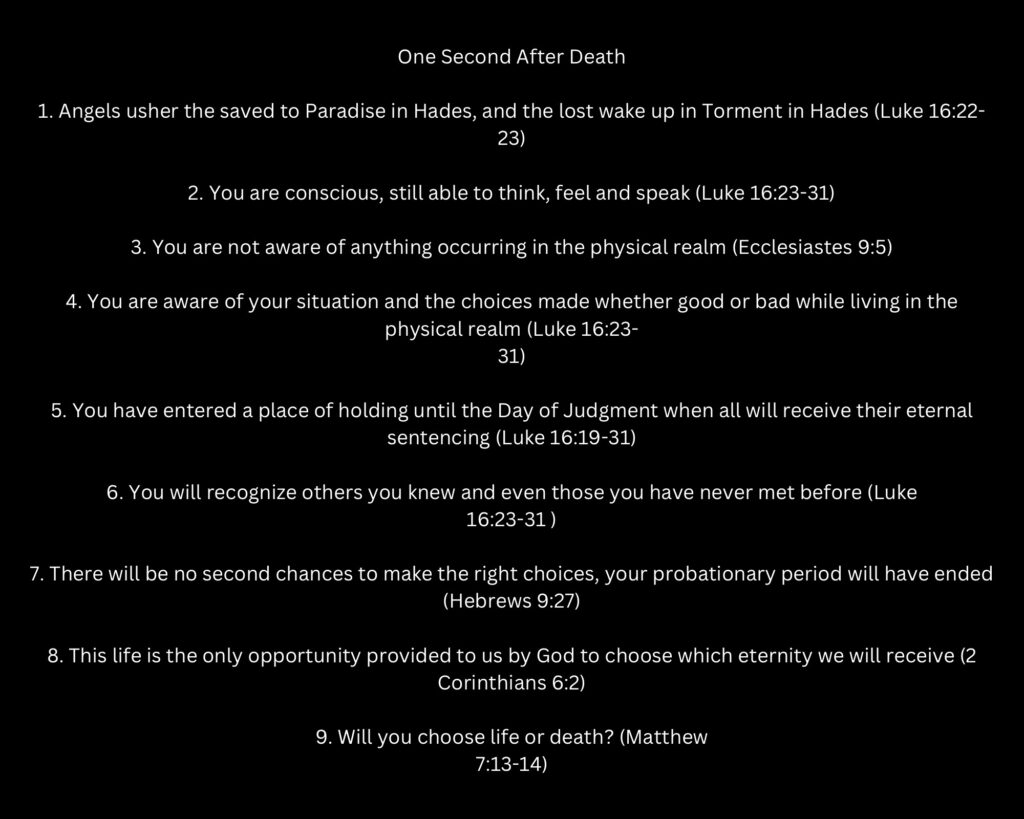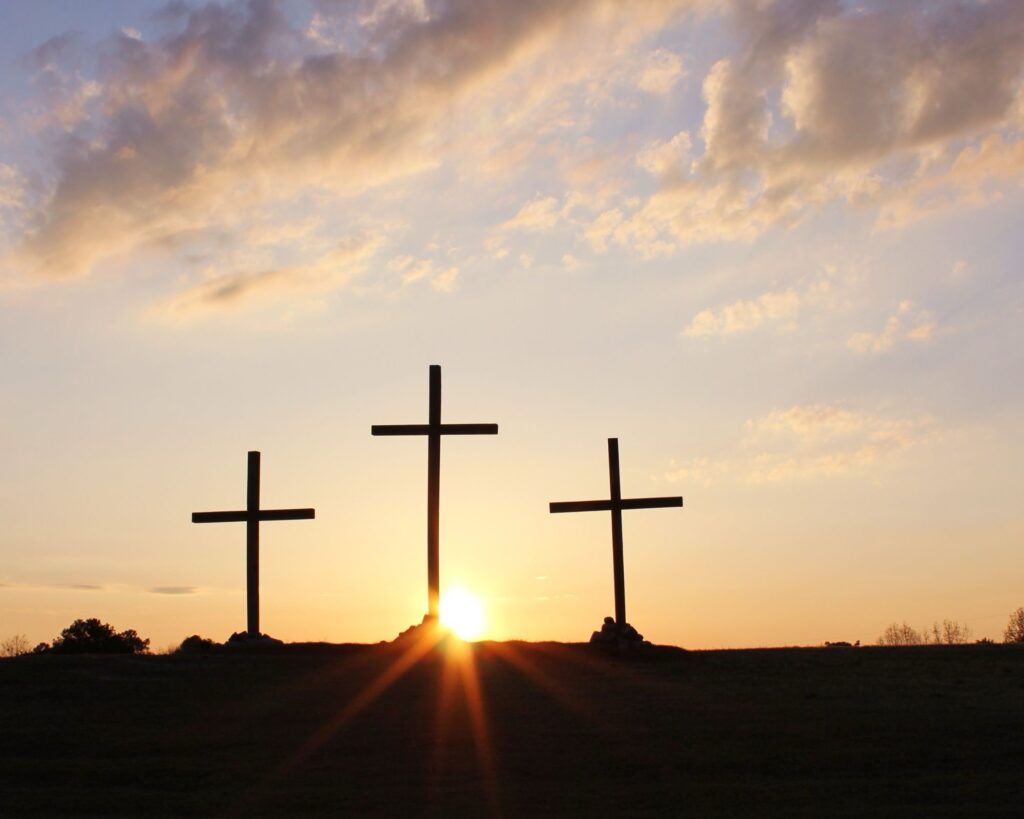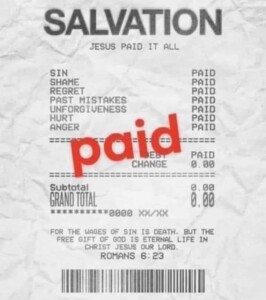The Moment After – A Biblical Exploration
The question of what happens one second after we breathe our last breath has intrigued humanity for millennia. It’s a moment shrouded in mystery, yet deeply significant, touching the core of our beliefs about life, death, and eternity. As Christians, our understanding of this pivotal moment is grounded in Scripture, offering a glimpse into the immediate transition from physical life to an eternal existence, divided into two stark realities: Paradise and Torment.

This exploration seeks to unravel the biblical narrative surrounding the moment after death, examining the profound realities of Paradise and Torment as described in Luke 16:22-23. Our journey through Scripture will reveal not just the destination of souls but the state of consciousness, awareness, and finality that accompany one’s entrance into the afterlife. As we delve into the Word of God, we find not only answers but also a call to reflection on our earthly lives and the choices we make, for they determine our eternal dwelling.
In “One Second After Death: The Reality of Paradise and Torment,” we will navigate through biblical insights to understand the immediate afterlife, aiming to bring clarity to this profound subject and inspire a deeper, more intentional walk with Christ. Let us embark on this journey with open hearts and minds, ready to engage with the truths Scripture reveals about the life to come.
Resurrection Remembrance: Should Christians Celebrate Easter? offers an insightful perspective on the significance of Christ’s resurrection, a cornerstone of our faith that directly impacts our understanding of death and the afterlife. As we ponder the realities beyond this life, it becomes ever more crucial to grasp the essence of the resurrection and its promise of eternal life for those who believe.
With this foundation, we turn to the Scriptures to explore the first moments after death, guided by the hope and truth of the Gospel, which illuminates our path from the temporal to the eternal.

The Immediate Afterlife: Paradise vs. Torment
The Bible presents a clear dichotomy of the afterlife: a reality of bliss for the saved and a state of suffering for the lost. This division, rooted in the parable of the rich man and Lazarus (Luke 16:22-23), offers profound insights into what awaits us beyond the veil of death.
Paradise: A Haven for the Saved Scripture tells us that angels usher the saved into Paradise, a place of comfort and rest. In Luke 16:22, we learn of Lazarus being carried by angels to Abraham’s side, symbolizing peace and divine fellowship. This depiction of Paradise as a haven aligns with the promise of eternal joy and communion with God, emphasizing the reward for those who trust in Him and live according to His teachings.
Torment: The Reality for the Lost Conversely, the rich man finds himself in a place of torment, fully conscious and in agony (Luke 16:23). This stark portrayal serves as a somber reminder of the consequences of a life lived apart from God’s commandments and the rejection of His grace. The reality of torment in the afterlife underscores the gravity of our earthly choices and the eternal implications they carry.
Consciousness Beyond Death A crucial aspect revealed in this narrative is the continuation of consciousness after death. The rich man, despite his torment, engages in conversation, feels anguish, and even expresses concern for his living relatives (Luke 16:23-31). This consciousness affirms that death does not lead to oblivion but a continued existence where thoughts, feelings, and memories persist.
Awareness of Earthly Life Both Lazarus and the rich man are depicted as retaining a vivid awareness of their earthly lives. The rich man’s reflection on his life and his request to warn his family (Luke 16:27-28) illustrate that our actions, beliefs, and choices made in the physical realm follow us into the afterlife, highlighting the importance of living a life aligned with God’s will.
The Irreversibility of the Afterlife’s Reality This passage firmly establishes that the afterlife is irreversible and final. There are no second chances or opportunities to alter one’s eternal destination once one has passed from the physical world. Hebrews 9:27 echoes this sentiment, stating, “it is appointed unto men once to die, but after this the judgment.”
Eternal Sentencing and Judgment Day Although immediate upon death, one enters either Paradise or Torment; the ultimate judgment by God still awaits. This final judgment will determine the eternal state of every soul, reinforcing the Biblical truth that our current life is a preparation for the next.
In understanding the immediate realities of the afterlife, we are confronted with the weight of our daily decisions and the urgency of living in accordance with God’s commandments. The parable of the rich man and Lazarus is not just a tale of caution but a call to action, inviting us to reflect on our spiritual state and to embrace the salvation offered through Christ.
As we contemplate the immediate transition from life to eternity, may we find encouragement and guidance in the How to Be a Christian: Starter Guide, which offers insights into beginning and nurturing a life-changing relationship with Jesus. This relationship is our bridge to Paradise, ensuring that when we face the moment of transition, we are prepared and at peace with our eternal destiny.

Consciousness and Communication Beyond Death
The parable of the rich man and Lazarus not only unveils the immediate realities of the afterlife but also presents a profound understanding of consciousness beyond death. This narrative challenges common misconceptions about death leading to unconsciousness or a state of non-existence.
Continuation of Conscious Existence The dialogue between the rich man and Abraham (Luke 16:23-31) illustrates that after death, individuals remain fully aware. This awareness extends to their emotions, thoughts, and even the capacity for communication. The rich man’s pleas and Abraham’s responses underscore that death transitions the soul into a different realm of existence without stripping away the essence of what it means to be a conscious being.
Emotional and Sensory Awareness One of the most striking aspects of the rich man’s experience is his ability to feel torment and express desperation. This indicates that the afterlife is not a passive state but one in which souls experience a range of emotions and sensations, albeit in a spiritual context. The detailed description of his thirst and plea for Lazarus to provide relief with a drop of water reveals that desires and sufferings, too, transcend physical death.
Intellectual and Communicative Abilities The rich man’s dialogue with Abraham highlights that intellectual and communicative abilities persist beyond the grave. He reasons, remembers his family, and seeks to warn them to change their ways to avoid his fate. This level of consciousness and concern for others implies that death transitions us into a new form of life where our thoughts and voices can still be articulated, though not in the physical realm we are accustomed to.
No Awareness of the Physical World While the rich man and Lazarus are depicted as conscious and communicative, Ecclesiastes 9:5 clarifies that the dead are unaware of anything happening in the physical world. This separation suggests that while conscious existence continues, it does so in a realm distinct from our earthly existence, focusing the afterlife experience on spiritual realities rather than earthly concerns.
The Importance of Earthly Choices The rich man’s regret and desire to send a warning to his living relatives emphasize the importance of the choices we make in the physical realm. The Misconception of Being Good Enough for Heaven explores this further by addressing common misunderstandings about earning salvation through good deeds. True salvation comes from faith in Christ and living in alignment with His teachings, underscoring the need for deliberate spiritual decision-making while we still inhabit the physical world.
The consciousness experienced in the afterlife as described in Luke 16 calls us to reflect deeply on our spiritual lives and the eternal implications of our earthly choices. It invites us to engage in meaningful conversations, seek understanding, and share the Gospel with others, knowing that our time in the physical realm is finite but impactful. For those seeking to deepen their relationship with God and explore the essentials of faith, Your 24/7 Bible Hotline for Life’s Emergencies provides a valuable resource for guidance, encouragement, and spiritual growth.

Awareness of Earthly Life and Final Choices
The rich man’s dialogue with Abraham in the parable (Luke 16:23-31) not only highlights the reality of consciousness after death but also underscores an acute awareness of earthly life and the consequences of one’s choices. This section delves into how individuals in the afterlife carry with them the knowledge of their actions and decisions made during their earthly existence.
Reflection on Earthly Existence The rich man’s pleas exhibit a clear reflection on his life and the choices he made. He vividly remembers his brothers and wishes to prevent them from following his path to torment. This implies that after death, individuals retain a memory of their earthly lives, along with a profound understanding of how those choices align with God’s will.
The Irrevocability of Life’s Decisions A critical element in this narrative is the finality and irrevocability of the choices made in the physical realm. Once individuals cross the threshold of death, the opportunity to alter their spiritual destiny ceases. Hebrews 9:27 emphasizes this point, stating, “Just as people are destined to die once, and after that to face judgment.” This verse reinforces the notion that the afterlife is a continuation of the life choices made on earth, solidifying one’s eternal fate.

No Second Chances After Death The conversation between the rich man and Abraham vividly illustrates that there are no second chances or opportunities to repent after death. The plea to send Lazarus to warn his brothers is met with the assertion that they have Moses and the Prophets to guide them (Luke 16:29). This response highlights that the time for choosing faith and obedience is now, in the living world, through the revelation of Scripture.
The Role of Earthly Life in Determining Eternity The Bible teaches that this life is our given opportunity to choose our eternal destiny. 2 Corinthians 6:2 urges us to recognize the importance of the present moment: “Now is the time of God’s favor, now is the day of salvation.” This urgency underscores the need for individuals to contemplate their relationship with God and the impact of their actions while they still have time.
Choosing Eternity: Life or Death The ultimate decision every person faces is choosing between eternal life with God or separation from Him in torment. Matthew 7:13-14 presents this choice as two paths: one narrow, leading to life, and the other broad, leading to destruction. Our earthly lives are the testing ground for which path we choose, urging us to seek the narrow way that leads to life.
The awareness of earthly life and the finality of our choices serve as a compelling call to introspection and spiritual awakening. It’s a reminder that our actions and decisions have eternal implications. For those navigating the complexities of faith and seeking guidance, How to Be a Christian: Starter Guide provides foundational insights into embracing a life dedicated to Christ. In contemplating our eternal destiny, we find motivation to live lives that reflect our commitment to God, ensuring that when we face the reality of the afterlife, we do so with confidence in the grace and salvation offered through Jesus Christ.

Navigating Eternal Decisions: Questions and Answers on Life After Death
As we’ve journeyed through the biblical narrative of life after death, exploring the realities of consciousness, awareness, and the irrevocable nature of our earthly choices, several poignant questions emerge. This final section seeks to address some of these queries, offering insights grounded in Scripture to guide our understanding and spiritual reflection.
If we are conscious after death, can we communicate with the living?
Scripture indicates that once we pass from this life, our awareness is confined to the spiritual realm. Ecclesiastes 9:5 suggests the dead know nothing of the living world’s affairs. The rich man’s desire to communicate with his living brothers (Luke 16:27-28) was not granted, underscoring a clear separation between the two states of existence.
Can our loved ones in heaven see us or intercede on our behalf?
The Bible does not provide explicit details on whether the departed in heaven can see us or intervene in earthly matters. Hebrews 12:1 speaks of a “great cloud of witnesses,” which some interpret metaphorically, referring to the legacy of faith left by those who have gone before us. Our focus should remain on God and His provision for us through prayer and His Word.
How can I ensure my afterlife is spent in Paradise and not Torment?
The assurance of spending eternity in Paradise comes through faith in Jesus Christ, repentance from sin, and living a life that reflects His teachings. John 3:16 and Romans 10:9 highlight belief in Christ as the pathway to eternal life. Engaging in a personal relationship with God, guided by Scripture, is essential. For those beginning this journey, How to Be a Christian: Starter Guide offers valuable steps toward embracing faith in Christ.
Is there a purgatory, a place to make amends after death before reaching Paradise?
The concept of purgatory is not found in Scripture. The biblical portrayal of the afterlife presents two distinct outcomes: Paradise or Torment, with our earthly lives determining our eternal destination. Hebrews 9:27 emphasizes the finality of death followed by judgment, pointing to the importance of making right choices while we still have the opportunity.
How can I live a life that prepares me for a favorable afterlife?
Living a life that prepares for eternity involves cultivating a personal relationship with Jesus, adhering to His commands, and embodying His love and grace in our interactions with others. Regular study of the Bible, prayer, and fellowship with other believers strengthen our spiritual foundation. Resources like The Transformative Power of Baptism: A Biblical Exploration can deepen understanding of key Christian doctrines and practices.
Embracing Eternity with Faith and Assurance The exploration of life after death, as outlined in Scripture, brings us face to face with the profound realities that await beyond our earthly existence. It challenges us to reflect on our spiritual state, the choices we make, and the relationship we cultivate with our Creator. As we navigate the questions and uncertainties of this life, let us hold fast to the promise of eternal life through faith in Jesus Christ, finding comfort in His presence and guidance in His Word. May our journey be marked by a steadfast pursuit of righteousness, guided by the hope of Paradise, and the assurance of His unending love.
As an Amazon Associate we earn from qualifying purchases through some links in our articles.




